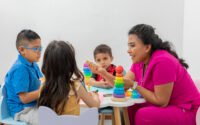Mindfulness and Emotional Regulation: Early Childhood Education
In today’s fast-paced world, it’s important to teach young students how to be aware and control their emotions. These skills help with growth in all areas and provide a solid base for learning throughout life. More and more, teachers and parents are using organised programs, such as an Early Childhood Education Online Course, to learn useful ways to help kids grow in a healthy way. This blog post talks about useful tools that promote emotional health and mindfulness in early childhood situations.
Table of Contents
1. Mindfulness and Early Childhood: Its Importance
2. Do you know what emotional regulation is? Why is it important?
3. How can teachers help students be more mindful in the classroom?
4. How Play Helps Kids Learn Emotional Skills
5. Are there easy ways to keep your emotions in check?
6. Using an Early Childhood Education Online Course to Integrate These Practices
7. Conclusion: Putting together a solid base
8. Frequently Asked Questions
Mindfulness and Early Childhood: Its Importance
Being mindful helps kids stay in the present and be aware of their feelings and thoughts. If you start it early, it helps you focus, be patient, and learn more about yourself. Mindfulness is often emphasised as a key part of creating a positive learning setting where every child feels safe and valued by teachers who take an Early Childhood Care and Education Course.

Do you know what emotional regulation is? Why is it important?
Emotional regulation means being able to handle and talk about your thoughts in a healthy way. This skill can help young students control their temper, nervousness, and anger. Professionals with ECCE Training know that teaching kids how to recognise and name their feelings is the first step towards helping them become emotionally strong and in control.
How can teachers help students be more mindful in the classroom?
Simple mindfulness practices, like guided imagery, deep breathing, and quiet reflection, can be built into daily lessons by teachers. Teachers who take an Early Childhood Development Course often learn age-appropriate activities that help kids stay calm and focused, like mindful stories or nature walks.

How Play Helps Kids Learn Emotional Skills
It’s normal and healthy for kids to play, and it helps them learn how to control their feelings. Kids can easily show how they feel through art, music, and pretend play. With an Early Childhood Education degree, teachers are better equipped to plan play-based activities that promote kindness, cooperation, and emotional intelligence.
Are there easy ways to keep your emotions in check?
Yes, it is easy to use techniques such as the “calm corner,” mood charts, and feeling journals. Giving kids special places and tools to think about their feelings is helpful. People who take an Early Childhood Education Course learn how to make safe places where kids can talk about their feelings and solve problems.

Using an Early Childhood Education Online Course to Integrate These Practices
The Early Childhood Education Online Course gives teachers and carers flexible access to up-to-date methods for promoting mental health. Emotional literacy, mindfulness practices, and classroom management methods for young students are some of the things that the course covers.
Conclusion: Putting together a solid base
Being mindful and controlling your emotions are important parts of learning from a young age. Children will be better prepared to face difficulties with confidence if these areas are given a lot of attention. An Early Childhood Education Online Course gives people who want to help kids get off to a healthy and balanced start the information and tools they need.
Frequently Asked Questions
1. What good things can mindfulness do for young kids?
Being mindful helps kids concentrate, calm down, and become more emotionally strong. It teaches them to think before acting, which helps them make better decisions as they grow older.
2. At what age should you start teaching kids how to control their emotions?
Beginning to learn how to control your emotions can happen as early as two or three years old. For the best results, techniques like naming feelings, using tools to calm down, and practicing deep breathing can be changed to fit the child’s stage of growth.
3. Is an online study a good way to learn these skills?
Of course. You can be flexible with your schedule and still get a good Early Childhood Education Certificate online. The modules are meant to give you practical methods that you can use right away in the real world.
4. How does playing help kids grow emotionally?
Kids can explore their feelings through play in a safe, creative setting. It gives them chances to work on skills like giving, waiting their turn, and understanding others, which are important for getting along with others and growing emotionally.



